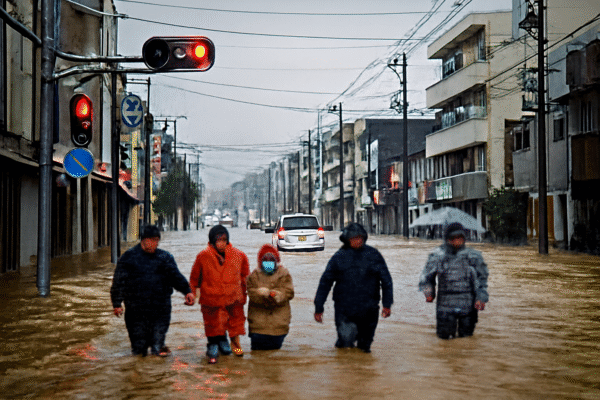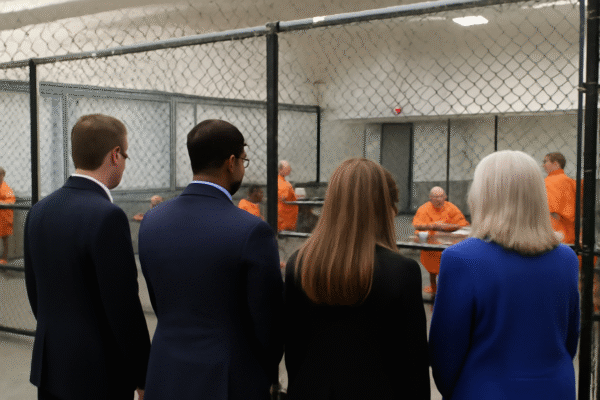In the heart of Aurora, Colorado, four prominent Democratic members of Congress recently visited a local U.S. Immigration and Customs Enforcement (ICE) detention center as part of their ongoing efforts to investigate the conditions faced by detainees. This facility, which has become a focal point for discussions about U.S. immigration practices, has sparked growing concerns about the treatment of individuals held in custody. U.S. Representatives Jason Crow, Joe Neguse, Brittany Pettersen, and Diana DeGette made this visit in an attempt to conduct crucial oversight and uncover the truth about detainee treatment, but they faced significant barriers in their quest for transparency.
This visit follows a series of troubling incidents where lawmakers have struggled to obtain accurate information or gain access to detainees within U.S. immigration detention centers. For Rep. Jason Crow, whose district includes the Aurora facility, this visit was particularly significant, as it underscored the difficulties lawmakers face in overseeing federal operations. Despite their oversight responsibilities, these elected officials found themselves stymied by a lack of cooperation from ICE staff, who informed them that answers could only be obtained from officials in Washington, D.C., further complicating efforts to make the system more transparent.
Lawmakers were only able to speak with one detainee during their visit, a restriction that limited their ability to fully understand the day-to-day realities within the facility. The group encountered additional delays when the facility went into lockdown for a headcount, preventing further interactions with detainees. These challenges raised further concerns about the transparency and accountability of detention centers and fueled the debate over the treatment of immigrants within the U.S. immigration system.
The frustration expressed by lawmakers highlights the broader issue of oversight and accountability within the detention process. Despite the significant role of Congress in monitoring federal agencies, it appears that the system is not functioning as intended, particularly in relation to detention facilities that house thousands of immigrants, many of whom face legal battles that could significantly affect their futures. For Rep. Crow, who has been in Congress for over six years, this experience marked one of the most difficult attempts to hold ICE accountable.
In addition to the challenges faced by lawmakers, reports from immigration attorneys and legal experts have shed light on the alarming conditions inside these detention centers. Zachary Sanders, an immigration attorney with experience working with detainees at the Aurora facility, shared his concerns about the widespread issues reported by those held within the center. He highlighted complaints about inadequate food, malfunctioning air conditioning, and incidents of physical altercations between detainees. Unfortunately, he also noted that the response from guards often left much to be desired, with some issues ignored or poorly handled.
While these problems have persisted for years, Sanders emphasized that conditions have worsened in recent months, particularly as detainees face increased barriers to accessing legal representation. Many detainees are unable to afford private attorneys due to the high costs of immigration law, leaving them vulnerable and without support as they navigate a complex and often opaque legal system.
One of the most pressing issues raised during the visit was the need for greater access to legal aid for those in detention. With many detainees unable to afford an attorney, they are left to navigate the intricacies of immigration law on their own, a daunting and often overwhelming task. The lack of legal representation compounds the difficulties they face within the detention system and underscores the need for reform.
During their visit, lawmakers also met with Jeanette Vizguerra, a well-known immigrant rights activist who has been detained at the Aurora facility since March 2025. Rep. DeGette, who had introduced a private bill to grant Vizguerra permanent residency while her immigration case is processed, took the opportunity to personally deliver the bill to her. Private bills, which are rarely introduced, are designed to provide relief for individuals who face unique challenges within the immigration system. DeGette’s efforts on behalf of Vizguerra reflect her ongoing commitment to advocating for immigrant rights and ensuring that individuals in detention are not left without legal protection.
The situation at ICE detention centers, particularly in Aurora, raises serious ethical and legal questions about the treatment of immigrants. As the number of detainees continues to rise, there are increasing calls for greater oversight and transparency within the system. Lawmakers and advocates are calling for reforms that will improve conditions for detainees, increase access to legal representation, and ensure that the U.S. immigration system is held accountable for its treatment of individuals.
While private bills, such as the one for Jeanette Vizguerra, offer a potential solution for individual detainees, broader systemic reforms are necessary to address the issues at the heart of the immigration detention system. Lawmakers must continue to push for policies that prioritize transparency, fairness, and the protection of immigrant rights, ensuring that the U.S. immigration system upholds its moral and legal obligations.
The challenges faced by lawmakers in their attempts to gain access to detainees and investigate conditions in detention centers reflect a deeper issue of transparency within the U.S. immigration system. As the debate continues, it remains to be seen whether meaningful reforms will be made to improve the treatment of individuals in ICE detention centers. The situation is not just a legal issue; it is a moral one that has significant implications for the integrity of the U.S. immigration system and the values upon which the country was founded.
For more travel news like this, keep reading Global Travel Wire















